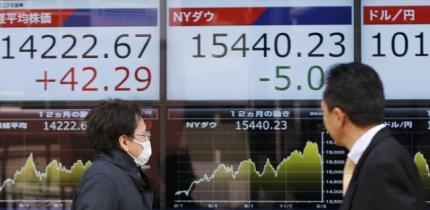BOJ officials signal readiness to act, warn of emerging mark
Bareksa • 06 Feb 2014

Pedestrians walk past electronic boards showing the Nikkei, DJIA and the exchange rates between the yen and the dollar, in Tokyo (REUTERS/Toru Hanai )
The selloff in emerging markets pushed the safe-haven yen to multi-month highs
Reuters - The Bank of Japan stood ready to expand monetary stimulus further to safeguard its inflation mandate, two top policy makers said on Thursday, warning that the rout in emerging markets was already affecting Japanese assets.
After nearly a year of monetary and fiscal stimulus roused the world's third biggest economy from decades of slumber, the concern among some in the BOJ is that trouble elsewhere could undermine the hard-won progress.
"Financial markets, including those for emerging economies, are making jittery movements," Hiroshi Nakaso, one of the BOJ's two deputy governors, told parliament on Thursday.
"If some kind of risk materialises, we will take necessary policy adjustments to ensure achievement of our 2 percent price target," said Nakaso, a career central banker with deep expertise on global affairs.
He warned that the sharp sell-off in emerging market currencies, triggered in part by the U.S. Federal Reserve's tapering of its massive stimulus, has already affected Japan by lifting the safe-haven yen and hurting equities.
Former academic Kikuo Iwata, the other deputy governor, blamed slack demand in emerging Asia as the main reason for soft exports.
But both stuck to the BOJ's upbeat view that Japan's economy is on track for a moderate recovery, dismissing the prospect that a second round of stimulus was imminent.
"Japan is making steady progress toward meeting the BOJ's 2 percent price target," Iwata told business leaders in Miyazaki,
southern Japan. "Under such circumstances, steadily proceeding with our current policy is what is most important."
Investors are waiting for the next trigger after a currency crisis in Argentina, signs of slowing growth in China and the
withdrawal of U.S. monetary stimulus hit emerging markets, prompting abrupt interest rate rises in deficit-laden India, South Africa and Turkey.
The selloff in emerging markets pushed the safe-haven yen to multi-month highs, boding ill for Japan's economy that needs
stronger growth in exports to make up for an expected drop in household spending after a sales tax hike in April.
SLUGGISH EXPORTS
Recent data pointed to an economy that continues to pick up momentum on strong domestic demand, driven by Prime Minister
Shinzo Abe's massive fiscal and monetary stimulus. But BOJ Governor Haruhiko Kuroda has cautioned about weak export demand.
Iwata echoed that view, saying lacklustre growth in ASEAN economies, which have close ties with Japan, was largely behind sluggish export growth.
"But we expect these economies to gradually gain momentum in the long-term as the recoveries in the United States, Europe and
China start to spread," he said, adding that exports will gradually increase as global demand recovers.
Exports to Asia as a whole make up more than half of Japanese shipments, with the ASEAN block taking up one seventh of the total.
An expected increase in exports and capital expenditure will help Japan withstand the pain from the sales tax hike, Iwata said, dismissing speculation the BOJ may pre-empt the damage from the higher tax with additional, immediate easing.
The BOJ has kept monetary policy steady after offering an intense burst of stimulus in April last year, pledging to double base money via aggressive asset purchases to spur inflation to 2 percent in roughly two years.
The central bank has said the current stimulus programme is enough to achieve the price target and that it will not respond to any temporary slump in the economy.
Japan's core consumer inflation rose at the fastest pace in more than five years in December, promising signs that the central bank's inflation goal was within reach.
Still, the sharp selloff in emerging markets may play into the hands of those in the BOJ who fret a pickup in exports is already lacklustre and so may need extra monetary stimulus sooner than later.<span 1.6em;"="">
Iwata said the BOJ won't end its ultra-easy policy unless 2 percent inflation is achieved in a stable manner, reassuring markets that briefly meeting the target won't automatically prompt the bank to start withdrawing stimulus.